I was stuck at my desk from dusk until dawn, writing about health and wellness as my body atrophied — I didn’t need the best treadmill, just one that would allow me to log some steps and keep the blood pumping while I made that cash money. After perusing the options and consulting with BarBend’s team of certified personal trainers and CrossFit athletes — who have tried out more than 50 treadmills — the Egofit Walker Pro-M1 stood out amongst the competition and I brought it home.
In this Egofit Walker review, we’re laying out all the pros and cons of this bite-size treadmill so you, too, can decide if it’s the right tool to increase your steps. To help you understand our testing, we’ll utilize the BarBend equipment testing methodology which provides a score between 1 (not good) and 5 (love it) in categories such as durability, delivery, value, and more. While the Egofit Walker isn’t going to knock your socks off with its tech features, we think it’s a reliable, portable tool for upping your mileage when stuck behind a desk. Read on for more thoughts about this walking treadmill.
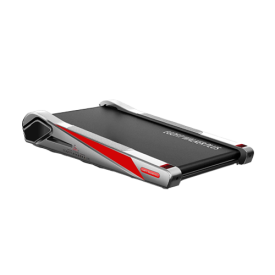
This slim, compact under-desk treadmill takes up less than six square feet of space, making for an excellent fit for athletes working in tight quarters. Plus, we appreciate the pre-assembled design of the Egofit Walker Pro, which eliminates any confusing setup instructions before getting into a walking workout.
Main Takeaways
- It’s simple to operate with a handheld remote control.
- The 5% incline helps me burn more calories in less time than if I were just walking on a flat surface. (1)
- While it’s small enough for me to pick up and move, the cut-out handles are awkwardly placed and unhelpful.
Egofit Walker Specs
| Price | $479 |
| Dimensions | 38.39” L x 21.85” W x 6.89” H |
| Weight | 48.5lbs |
| User Weight Capacity | 220lbs |
| Incline Range | Fixed 5% |
| Max Speed | 3.1mph |
| Assembly Required? | No |
After using the Egofit Walker Pro-M1 for nearly 8 months in my home office, I’ve come to rely on it as a key part of my routine when I don’t have the time or energy to tackle a full workout after I clock out. When not in use, its slim design allows me to stow it on its side next to the wall. Then when I’m ready to get walking, I lay down a yoga mat, hoist it up, and carefully place it beneath my desk. I plug it in, flip the power switch on the treadmill, set up my adjustable standing desk, and then use the remote control to start steppin’.
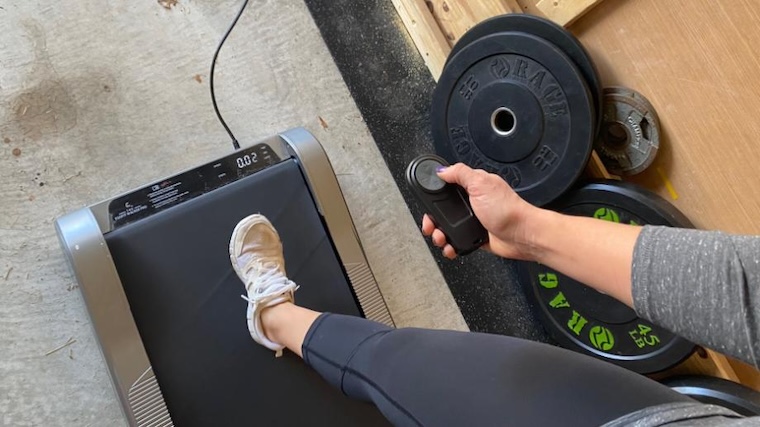
Since I’ve been using it consistently, I’ve found it to be an easy way to squeeze in some light cardio while working in my office or watching Survivor from the living room. The maximum speed on this treadmill is 3.1 miles per hour, which may sound slow, but it’s almost too fast for multi-tasking. At its top speed, I would look like an absolute fool trying to participate in a Zoom call. But when I’m writing an article, I find walking at around 2 miles per hour to be an ideal pace that allows me to write complete sentences and spell most words correctly (this is why we have editors).
When perusing the best under-desk treadmills, BarBend expert contributor and certified personal trainer Amanda Capritto tells us what to keep in mind: “..You should look for a motor with at least 1.5 CHP, a weight capacity of at least 220 pounds, a deck of at least 36 inches, and speeds from 1 to 5 miles per hour, assuming you’re not going to be running on it.”
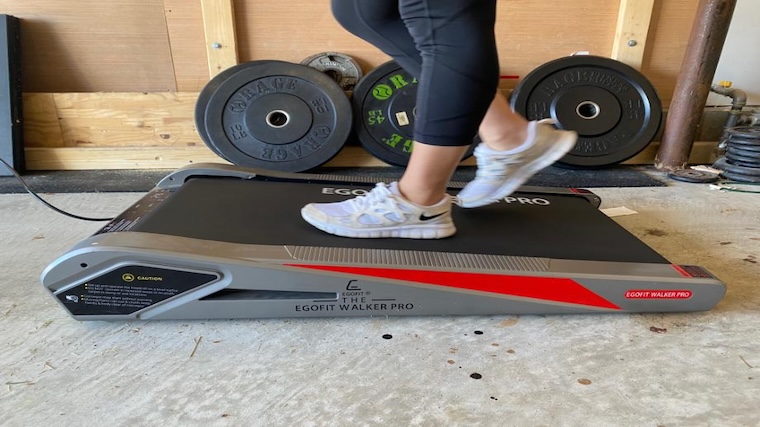
The EgoFit Walker Pro falls below Capritto’s marks when it comes to its 34-inch belt deck length, top speed of 3.1 miles per hour, and sub-par 2.0 HP (horsepower) motor. A 2.0 HP motor is the motor’s power at its peak, while a 2.0 CHP (continuous horsepower) is the power at which the motor can run continuously. While I’m not wanting for more stride length, speed, or a stronger motor for my low-intensity strolls, I imagine this model’s motor may not last as long as a CHP motor on higher-priced machines.
But I don’t need a powerful machine for my walk-and-work purposes. I just wanted something compact and affordable that would help me get my steps in. When I was debating between this treadmill and the competition, the final deciding factor that pushed me towards purchasing the Egofit Walker Pro was the fixed 5% incline. The incline isn’t huge — far less than the 12- to 40% tilt found on the best incline treadmills — but it’s just enough to help raise my heart rate and make my walk a little more challenging (even when I’m moving at a snail’s pace).
Who Should Use / Who Shouldn’t Use the Egofit Walker
BarBend editorial member and certified personal trainer Kate Meier and I both own the Egofit Walker Pro. While it was the right choice for us, the following are who we think would and wouldn’t be ideal candidates to bring this walking treadmill into their homes.
Recommended for:
- Individuals who work from home but want to get more steps in
- People in small living spaces who want a walking treadmill
- Anyone who wants to increase their daily step count
Not Recommended for:
- Serious runners or high-intensity trainers
- Users with balance concerns or limited mobility
- Fitness enthusiasts who want advanced tech features
Our Experience Training With the Egofit Walker
The Egofit Walker Pro-M1 offers a convenient way to tackle at-home workouts without having to leave your workspace — I should know, I’m walking on it as I write this. Designed to fit under a desk or in small spaces, it operates quietly and smoothly so I can walk while working, scrolling through TikTok, or catching up with my parents on the phone. The following are some additional notable features to help you understand what it’s like using this mini treadmill, utilizing our scoring rubric from 1 (bad) to 5 (great) in areas like durability, value, ergonomics, and more.
Training Capabilities
While some members of the BarBend team think the 5% fixed incline on this treadmill isn’t ideal, I love it. This slight incline isn’t enough that it messes up my workflow, or causes me to grasp onto my desk for support, but it adds a little bit of spice for my calves. Additionally, I like that I don’t have to adjust my incline every time I step onto this treadmill since it’s preset.
However, the incline is fixed, there aren’t handrails for support, and no safety key to shut the belt off if you were to stumble. Users with balance concerns may want to browse some other options on our list of the best treadmills for walking.
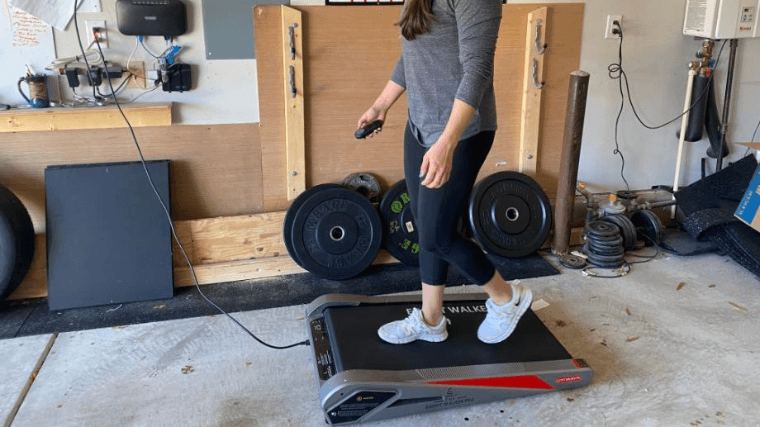
The Egofit Walker can reach a max speed of 3.1 miles per hour, and has 41 micro-adjustments to ensure you can find the right pace for you. When working from my desk, I prefer to have the speed at the middle range so I’m not bouncing around while trying to type. However, when using this treadmill at its top speed, I’m forced to jog with an awkward form because the belt deck is so short.
If you’re in the market for a treadmill that allows you to jog, this won’t be the item for you. The 34-inch belt deck is very short, and most people won’t be able to jog with their natural gait. “People who intend to run or sprint on their treadmill should look for a running deck of at least 60 inches in length,” says BarBend expert contributor Amanda Capritto. “Walkers and joggers can get away with shorter decks, unless they are really tall individuals. Fifty to 55 inches can usually cut it for walking and light jogging.” Due to this short belt deck, ergonomics scores a 2.5 out of 5.
Size and Portability
The Egofit Walker Pro takes up less than 6 square feet — about one-third the size of a twin-size bed. (2) It also weighs less than 50 pounds, making it easy to maneuver from an office to a living room and back again. While you’ll also find transport wheels, I’ve only used them sparingly because it’s easier to just pick the treadmill up in deadlift fashion and place it where I want it. BarBend editorial member and certified personal trainer Kate Meier agrees, noting, “It’s… kind of an awkward shape, but is fine for me to lift.”
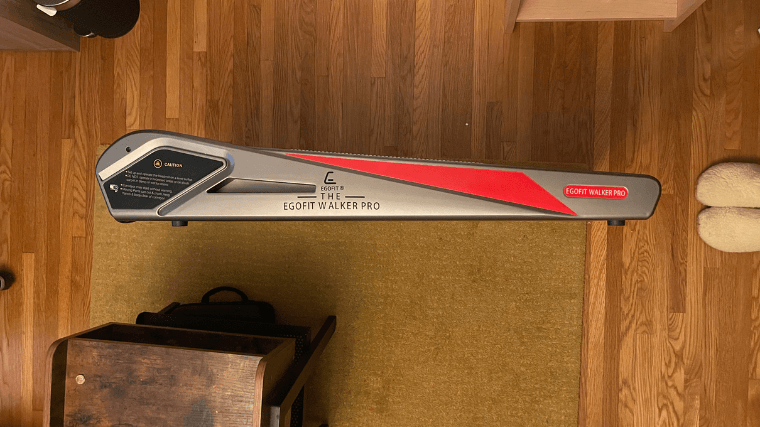
My only complaint is that there are cutouts I assume to be handles, but they’re located in a place that makes no sense. They’re located down by the transport wheels, so they can’t be used when rolling the treadmill. I’ve tried holding the treadmill pressed flush to my body, but this squishes my fingers in the cutouts.
When I need to move it around, I lift this treadmill by grasping onto the front end and back end of one side rail, making sure to lift with my legs and protect my back. (I’m relatively fit, but I once threw out my back when picking up a cat.) Portability scores a 4 out of 5, placing it on par with some of the best portable treadmills we’ve tested.
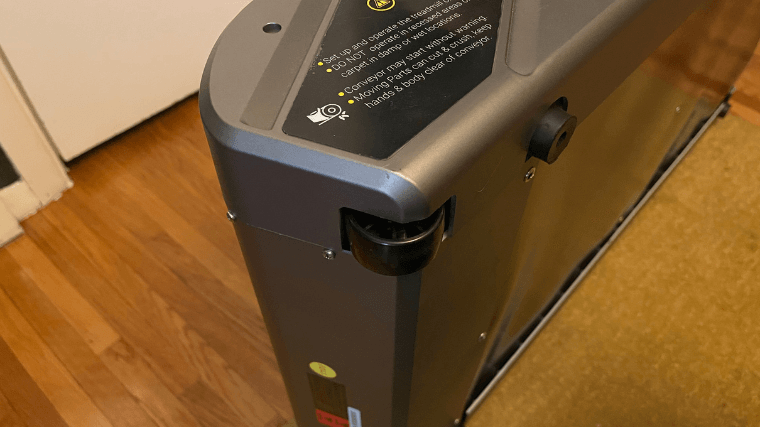
Additionally, this treadmill’s portability extends its usability to more unconventional spaces. Due to its compact size, it can easily fit in the backseat of my Prius, so if I wanted to take it with me on holiday like a psychopath (no judgment) or cart it back and forth from the office to my home, that’s totally in the realm of possibility.
A Simple Machine
This treadmill is as simple as they come, making it an enticing option for users of all experience levels. The handheld remote control, which Meier likes to keep in her pocket when she’s walking, can start, stop, and adjust the speed of the treadmill’s belt.
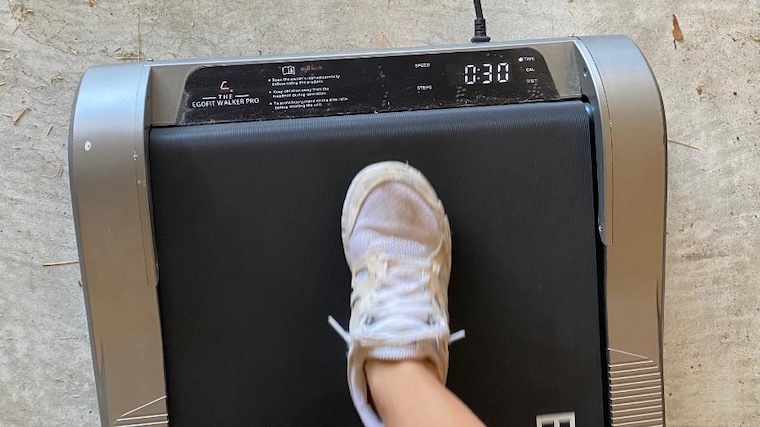
Plus, the small LED display at the top end of the treadmill rotates through some basic metrics like speed, calories, time, distance, and steps. Tech capabilities score a 2 out of 5, but ease of use scores a perfect 5 out of 5.
I don’t tend to trust metrics provided on wallet-friendly fitness devices, even if they are the best budget home gym equipment, so I opted to use the fitness tracker on my Apple Watch. At first, I wasn’t able to get my watch to track my walking workout since my arms were glued to my laptop and not swinging forward and back. “Have you finished your workout,” kept popping up because my watch unjustly suspected I wasn’t walking — the audacity! However, I was able to remedy this frustration by opting to track my walk via “indoor cycling” rather than via a “walking” workout.
What to Consider Before Buying the Egofit Walker
Bringing home new fitness equipment takes a good amount of consideration unless you’re like me and buy things without restraint after having a few glasses of wine. To help you nail down if the Egofit Walker is the right choice for you and your goals, consider the following points.
- Limited Training Capabilities: Consider if you’ll be happy with a top speed of 3.1 miles per hour, a fixed 5% incline, a 34-inch belt deck. The latter, specifically, may be an issue for taller walks or those with longer gaits. If you want to jog or run, you’ll likely want to opt for a traditional treadmill.
- Weight Capacity: Unlike the best treadmills for heavy people, the user weight limit on the Egofit Walker Pro is 220 pounds, so consider if this will be able to support you.
- Storage Space: Although it’s compact, this treadmill will likely need a dedicated space for use and storage, whether that’s a closet or under a bed. “Triple-measure your space to make sure it will fit!” adds Amanda Capritto, BarBend expert contributor and certified personal trainer.
- Balance Needs: Users should consider their balance and flexibility since the Egofit Walker Pro lacks handrails and may feel less stable than a typical treadmill.
Egofit Walker Vs. Competitors
When looking for the best walking treadmill, you may feel overwhelmed by the options on the market. To help you see how the Egofit Walker Pro compares to others that can be used from a standing desk, take a look at the chart below that details how it stacks up against options like the LifePro Fitness PacerMini and Walking Pad P1.
| Egofit Walker Pro | LifePro Fitness PacerMini | Walking Pad P1 | |
| Price | $479 | $424.99 | $499 |
| Dimensions | 38.39” L x 21.85” W x 6.89” H | 32.7” L x 25.0” W x 41.0” H | 56.37” L x 21.5” W x 5” H |
| Weight | 48.5lbs | 46lbs | 62lbs |
| User Weight Capacity | 220lbs | 220lbs | 220lbs |
| Incline | Fixed 5% | Fixed 7% | NA |
Ordering and Assembling the Egofit Walker
The Egofit Walker Pro arrived in a little less than a week when I ordered it from Amazon. I had been considering a folding treadmill as well, so I was relieved that Amazon gave me a 30-day window in case I wanted to return the Egofit Walker Pro. Within 10 minutes of dragging the box into my home, it was up and running (well, walking). It came fully assembled. All I had to do was pop batteries into the remote, plug it in, and start it up.
Places to Buy the Egofit Walker
The Egofit Walker Pro can be purchased from the Egofit website or on Amazon.
Brand Reputation and Customer Reviews
Egofit is a Chinese manufacturer that specializes in making what they claim are the “world’s lightest and smallest treadmills.” They’ve built a reputation as a brand known for making some of the best compact exercise equipment, with options that are simple, user-friendly, and tailored for home and office use. There are over 1,000 mostly positive reviews on Amazon for this product, with an overall rating of 4.5 out of 5.
Warranties
This treadmill is covered by a 1-year warranty, however, the user manual warns that if you overtighten the treadmill belt it will void warranty coverage for your belt.
Final Thoughts on the Egofit Walker
The Egofit Walker Pro was a purchase that had me wondering, “Why didn’t I get a walking treadmill sooner?” I was fearful I wouldn’t be able to walk and work — it’s hard enough for me to change out of my pajamas when I’m working remotely — but it’s been an excellent addition for when I’m stuck on Zoom meetings, proofing drafts, and sending off pithy email responses. Some days I’m tired and just want to focus on work, but even when I only walk for 15 or 20 minutes my mood brightens and I get this surge of energy.
It’s a simple machine that isn’t going to wow you with tech features, but if you’re looking for something that’ll help you reach your step goal, and is compact and portable, we think the Egofit Walker may be just the ticket.
Egofit Walker FAQs
How much does the Egofit Walker Pro cost?
This walking treadmill is listed at $479, but can often be found at a discount closer to $400.
Where is Egofit made?
Egofit treadmills are manufactured in China.
What is the weight limit on the Egofit Walker Pro?
The max user weight limit is 220 pounds on the Egofit Walker Pro.
References
- Silder A, Besier T, Delp SL. Predicting the metabolic cost of incline walking from muscle activity and walking mechanics. J Biomech. 2012 Jun 26;45(10):1842-9. doi: 10.1016/j.jbiomech.2012.03.032. Epub 2012 May 11. PMID: 22578744; PMCID: PMC4504736.
- Abbas, A. (2021d, December 15). Standard sizes for various types of furniture. The Spruce. https://www.thespruce.com/standard-furniture-measurements-1391374